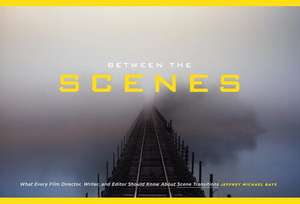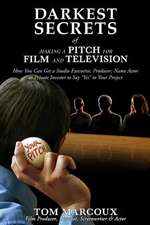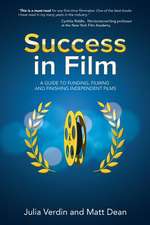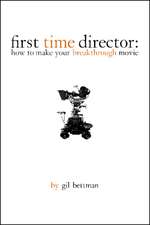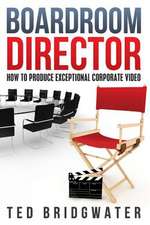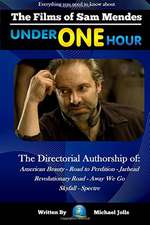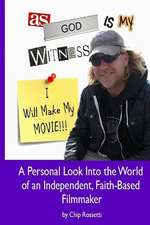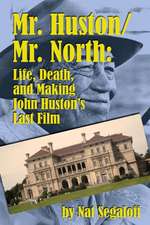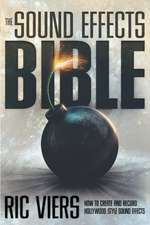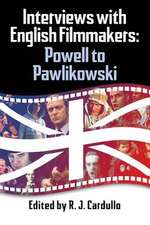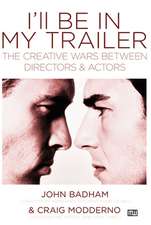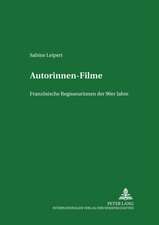Between the Scenes
Autor Jeffrey Michael Baysen Limba Engleză Paperback – 13 feb 2014
Between the Scenes delivers a fresh approach to film directing, screenwriting, and editing. once you’ve got your scenes planned out, this book steps in by shifting your focus to how your individual sequences and scenes connect to each other. you’ll find new ways to create emotional feelings in your audience. From location choices, to character movement between scenes, to the use of music, scene transitions are where the meat is in your story, and now you’ll discover a new pallet of creative possibilities.
Preț: 168.63 lei
Nou
Puncte Express: 253
Preț estimativ în valută:
32.29€ • 33.12$ • 27.18£
32.29€ • 33.12$ • 27.18£
Carte disponibilă
Livrare economică 05-19 februarie
Livrare express 22-28 ianuarie pentru 31.13 lei
Preluare comenzi: 021 569.72.76
Specificații
ISBN-13: 9781615931699
ISBN-10: 1615931694
Pagini: 137
Ilustrații: 100+ Black and White Photos
Dimensiuni: 280 x 181 x 11 mm
Greutate: 0.48 kg
Editura: Michael Wiese Productions
ISBN-10: 1615931694
Pagini: 137
Ilustrații: 100+ Black and White Photos
Dimensiuni: 280 x 181 x 11 mm
Greutate: 0.48 kg
Editura: Michael Wiese Productions
Cuprins
TABLE OF CONTENTS
Introduction
How To Use This Book
Looking at Films in a new Way
From Instinct to Craft
The Hidden Art: Why nobody notices
1. WHAT IS A SCENE TRANSITION?
On the Set
Anatomy of a Scene Transition
Choices at the Transition
The Life of a Scene Transition
Six Major Transitions
Transitions Between Sequences and Scenes
Grab your Script
2. CHOOSING LOCATIONS THAT COLLIDE
Scenequakes
Collision with oppositions
Sudden Absence
Add More Drama to Boundaries
Mental Maps
Single Location Films
3. TYING YOUR EVENTS TOGETHER
The Train
Linking Through Similarity
The Wright Wipe
The Hook
Linking Multiple Plots
4. EMOTIONAL PEAK: CHARACTER ON THE MOVE
On the Move
Looking at the Script
Anatomy of Character at the Scene Change
Emotional Ingredients
To Show It or not to Show It
If It’s not in the Script
Dialogue in Motion
Adding Other Characters
5. EMOTIONAL EBB: SCENERY AND RELIEF
Give Them a Break
The Cinematic Ebb
Variations in Camera Proximity
The Audience Thinking and Feeling
Connecting to Audience Feeling
Uses of Scenery
Objects, Motifs, Symbols
Other Ways of Relief
Storyteller’s Attitude
6. MUSIC AND TRANSITIONS
Silence
Mechanical Uses of Music
Telling the Story With Music
Variations of Transformation Tactics
Using Pre-Recorded Songs
The Role of Lyrics
7. PUZZLING THE SCENES TOGETHER
Tension and Release
Scenes and their Flow
Looking at the Script
Deleted Scenes
Fragmentation and Crescendo
Intensity of Transitions
Types of Transitional Scenes
Bridging Them All Together
8. THE TIME MACHINE
Storytelling is Abbreviation
Ways to Show Time Manipulation
Transitional Editing Speed
Other Time Styles
When not to Show Time
Gestalt’s Cousin
9. CASE STUDY: RIDLEY SCOTT’S GLADIATOR
The Longest Transition Ever
Maximus Escapes Execution
Sleeping Through the Night
Crosscutting To Family’s Murder
The Big reaction
Carried to Zucchabar
10. TELEVISION VS. FEATURE FILM TRANSITIONS
Film and TV Differences
Commercial Breaks
Multiple Plots
The Future of Storytelling
Introduction
How To Use This Book
Looking at Films in a new Way
From Instinct to Craft
The Hidden Art: Why nobody notices
1. WHAT IS A SCENE TRANSITION?
On the Set
Anatomy of a Scene Transition
Choices at the Transition
The Life of a Scene Transition
Six Major Transitions
Transitions Between Sequences and Scenes
Grab your Script
2. CHOOSING LOCATIONS THAT COLLIDE
Scenequakes
Collision with oppositions
Sudden Absence
Add More Drama to Boundaries
Mental Maps
Single Location Films
3. TYING YOUR EVENTS TOGETHER
The Train
Linking Through Similarity
The Wright Wipe
The Hook
Linking Multiple Plots
4. EMOTIONAL PEAK: CHARACTER ON THE MOVE
On the Move
Looking at the Script
Anatomy of Character at the Scene Change
Emotional Ingredients
To Show It or not to Show It
If It’s not in the Script
Dialogue in Motion
Adding Other Characters
5. EMOTIONAL EBB: SCENERY AND RELIEF
Give Them a Break
The Cinematic Ebb
Variations in Camera Proximity
The Audience Thinking and Feeling
Connecting to Audience Feeling
Uses of Scenery
Objects, Motifs, Symbols
Other Ways of Relief
Storyteller’s Attitude
6. MUSIC AND TRANSITIONS
Silence
Mechanical Uses of Music
Telling the Story With Music
Variations of Transformation Tactics
Using Pre-Recorded Songs
The Role of Lyrics
7. PUZZLING THE SCENES TOGETHER
Tension and Release
Scenes and their Flow
Looking at the Script
Deleted Scenes
Fragmentation and Crescendo
Intensity of Transitions
Types of Transitional Scenes
Bridging Them All Together
8. THE TIME MACHINE
Storytelling is Abbreviation
Ways to Show Time Manipulation
Transitional Editing Speed
Other Time Styles
When not to Show Time
Gestalt’s Cousin
9. CASE STUDY: RIDLEY SCOTT’S GLADIATOR
The Longest Transition Ever
Maximus Escapes Execution
Sleeping Through the Night
Crosscutting To Family’s Murder
The Big reaction
Carried to Zucchabar
10. TELEVISION VS. FEATURE FILM TRANSITIONS
Film and TV Differences
Commercial Breaks
Multiple Plots
The Future of Storytelling
Notă biografică
Jeffrey Michael Bays is most widely known for XM Satellite radio’s groundbreaking drama Not From Space (2003), a feature-length radio play that pioneered Internet recording techniques. In addition to his radio career, Jeffrey is a film scholar and director, and runs the popular Hitchcock website How to Turn your Boring Movie
Into a Hitchcock Thriller. As an avid fan of Alfred Hitchcock, Jeffrey directed the Australian suspense film Offing David starring Nathaniel Buzolic (Vampire Diaries). Jeffrey has a BA from Webster University, and an MA in Cinema from La Trobe University, Australia.
Into a Hitchcock Thriller. As an avid fan of Alfred Hitchcock, Jeffrey directed the Australian suspense film Offing David starring Nathaniel Buzolic (Vampire Diaries). Jeffrey has a BA from Webster University, and an MA in Cinema from La Trobe University, Australia.
Descriere
Between the Scenes delivers a fresh approach to film directing, screenwriting, and editing. once you’ve got your scenes planned out, this book steps in by shifting your focus to how your individual sequences and scenes connect to each other. you’ll find new ways to create emotional feelings in your audience. From location choices, to character movement between scenes, to the use of music, scene transitions are where the meat is in your story, and now you’ll discover a new pallet of creative possibilities.
